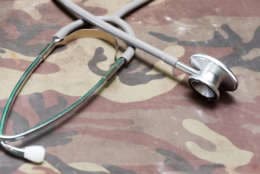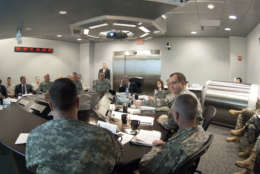DoD Reporter's Notebook
-
The 2018 omnibus bill delivers 56 percent plus-up in DoD facility maintenance spending, but it's not nearly enough to reverse years of underfunding.
April 03, 2018 -
The Defense Department is working to wrangle artificial intelligence projects across 40 different DoD organizations into a coherent S&T investment strategy.
March 20, 2018 -
DoD says the transition to new contractors, conducted while it was also restructuring its health plan's benefits, proved more complicated than expected.
March 20, 2018 -
The Pentagon slashes the potential value of REAN Cloud's OTA from $950 million to $65 million, says only U.S. Transportation Command can use it.
March 06, 2018 -
A few months into the Army's pilot program to directly commission cyber officers, Lt. Gen. Paul Nakasone says entry-level pay isn't cutting it.
March 06, 2018 -
The Marine Corps formally establish Cyberspace Occupational Field, including seven specific military cyber specialties.
March 06, 2018 -
DoD releases eight questions and answers on highly-anticipated cloud project, most of which amount to "stay tuned."
February 20, 2018 -
Navy sees upcoming NGEN contract as opportunity to ‘rip and replace’ NMCI’s fundamental architecture
The Navy wants to use its multibillion dollar NGEN recompetition to reenginner its networks for more cloud-like services.
February 20, 2018 -
IG review finds DoD has closed previously-identified gaps in quality of medical care.
February 20, 2018 -
DoD's Director of Operational Test and Evaluation urges the Pentagon to put further JRSS deployments on hold.
January 30, 2018 -
The Navy's Space and Naval Warfare Systems Command is the latest DoD organization to jump on the OTA bandwagon with an arrangement that would spend $100 million on 14 cyber technology areas.
January 30, 2018 -
The Defense Innovation Board, tasked by Congress to deliver report on software acquisition, is doing all it can to avoid writing a long document that will gather dust on a shelf.
January 30, 2018 -
The Navy will no longer discharge sailors who fail its physical fitness assessment, and is cancelling early-out programs that let sailors leave the military voluntarily, steps officials say are required by a "growing Navy."
December 26, 2017 -
Audit finds more than 250 ways in which DoD's Qatar base violates the department's own safety standards, similar to recent findings at other overseas installations.
December 26, 2017 -
The Army is beginning its first experiment in fast-tracking the officer accession pipeline for civilians with cyber skills. But it's proceeding cautiously: only five new officers per year.
December 12, 2017















